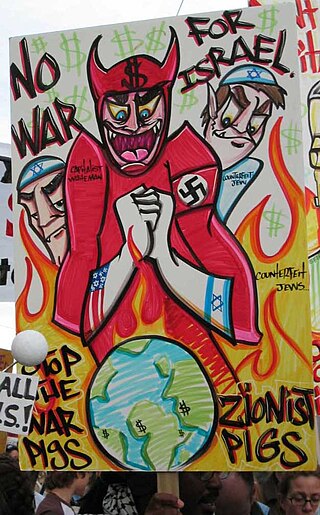Comparisons between Israel and Nazi Germany
the ahistorical comparison of Israel to Nazi Germany or Israelis to WWII Nazi Germans From Wikipedia, the free encyclopedia
Remove ads
Comparisons between Israel and Nazi Germany are a subject of significant controversy. Scholars intensely debate whether it is appropriate to compare Israel and Nazi Germany, given the legacy of the Holocaust. Scholars also debate whether these comparisons are a form of antisemitism known as Holocaust inversion.[1][2]
An editor thinks that this article may not be neutral. (July 2025) |

According to some scholars and critics of Israeli policy, comparisons between Israel and the Nazis is a rhetorical device to highlight specific actions or policies without antisemitic intent. Conversely, many historians,[3] governments,[4] and Jewish organizations argue that these comparisons are not historically valid, and that they deny or minimize the uniqueness of the Holocaust while demonizing Jews and the Jewish state.[5][6]
Remove ads
20th century
1940s
People made comparisons between Zionism and Nazism even before Israel was founded in 1948. In 1945, a British politician named Edward Spears said political Zionism was like the Nazi idea of Lebensraum (living space).[4][7]
Victor Klemperer, a German-Jewish writer who survived the Holocaust, wrote that both Zionism and Nazism were similar kinds of nationalist ideas.[8] English historian Arnold J. Toynbee also compared Zionism to Nazism, but later changed his mind after other scholars criticized his view.[9]
In 1948, famous Jewish thinkers like Hannah Arendt and Albert Einstein signed a letter. The letter compared a political party led by Menachem Begin to Nazi-like groups.[10]
1960s-1970s
During the Six-Day War in 1967, the Soviet government said Israel's military actions were like Nazi Germany's.
After the Likud party won Israel's election in 1977, right-wing politicians in Israel began using Holocaust comparisons to describe their left-wing opponents.[11]
1980s
An Israeli philosopher, Yeshayahu Leibowitz, warned that occupying the Palestinian territories could make Israelis act like "Judeo-Nazis." He said it could hurt the morals of the Israeli army.[12]
In 1983, a scholar named Boaz Evron said that if Israel became an immoral society, it would not survive, just like Nazi Germany did not.
During the First Intifada, historian Omer Bartov wrote a letter to Israeli leader Yitzhak Rabin. He said that telling soldiers to "break the bones" of Palestinians could make the army brutal, like the German army in World War II.[13]
A Holocaust survivor, Yehuda Elkana, warned in 1988 that if Israel saw all its enemies as Nazis, it might start acting like Nazis itself.[13]
Remove ads
21st century
Comparisons by Israelis
In the 21st century, some Israeli soldiers, politicians, and public figures have also compared Israel and Nazi Germany.
In 2005, some Israeli settlers wore yellow stars during protests. They did this to compare their removal from Gaza to the persecution of Jews in the Holocaust.[14]
In 2012, a former Israeli soldier was quoted saying he felt like a Nazi during his service in the First Intifada.[15] Another soldier in 2014 said that damage in Gaza looked like photos of Warsaw destroyed in World War II.
In 2016, an Israeli general, Yair Golan, gave a speech that seemed to compare modern Israel to 1930s Europe. He later said he did not mean to compare Israel to Nazi Germany. However, in 2019, he did compare right-wing Israeli politicians to Nazis.[16][17]
Yair Netanyahu, the son of the prime minister, compared an Israeli movement to Nazi Germany in 2020.[18] A former general, Amiram Levin, said in 2023 that Israel's control of the West Bank was like Nazi Germany's policies.[19]
In December 2023, a mayor said Gaza should be made empty like Auschwitz. The Auschwitz Museum said his words sounded like a call for murder.[20]
In February 2025, a left-wing politician, Ofer Cassif, compared Israel's plan for Gaza to the emigration of Jews from Nazi Germany. Right-wing politicians criticized him strongly for this.
A politician named Moshe Feiglin compared both Israel and Palestinians to Nazis in a statement about Gaza.
Statements by Palestinians
In August 2022, Palestinian President Mahmoud Abbas was in Berlin, Germany. When asked about a Palestinian attack in 1972, he said Israel had committed "50 Holocausts" against Palestinians.
The German Chancellor, Olaf Scholz, later said that comparing other events to the Holocaust is unacceptable, especially for Germans. A German newspaper called the remarks antisemitic. Afterward, Abbas said he did not mean to downplay the Holocaust. He said he was trying to talk about the suffering of the Palestinian people since 1948.[21]
Statements by international politicians
Some politicians from other countries have also compared Israel to Nazi Germany.
In 2016, a Swedish housing minister, Mehmet Kaplan, had to resign. This happened after a 2009 video surfaced. In the video, Kaplan said Israel treats Palestinians like Nazis treated Jews in the 1930s.[22]
In 2018, Turkey's President, Recep Tayyip Erdoğan, said that the "spirit of Hitler" lives in Israel. He said Israel's belief that Israel is only for Jews is like Hitler's belief in a pure race. Israeli Prime Minister Benjamin Netanyahu condemned the remarks and criticized Erdoğan's government.
In 2023, the President of Tunisia, Kais Saed, said that while Tunisians protected Jews in the Holocaust, Israel was now bombing children in Gaza. A Jewish leader said comments like this could cause hatred against the Jews still living in Tunisia.[23]
In February 2024, Brazil's President, Luiz Inácio Lula da Silva, caused controversy by comparing Israel's war in Gaza to the Holocaust.[24]
In April 2025, an Argentine lawmaker, Vanina Biasi, was charged for her tweets. She had called Israel a "Nazi" state and described the war in Gaza as a "Holocaust."[25]


Remove ads
Criticism
Bernard-Henri Lévy
French philosopher Bernard-Henri Lévy believed that the prevalence of Holocaust inversion had encouraged violence against Jews:[27]
[A] mass movement demanding the deaths of Jews will be unlikely to yell "Money Jews" or "They Killed Christ." [. ...] for people to feel once again [...] the right to burn all the synagogues they want, to attack boys wearing yarmulkes [...] an entirely new discourse[28] way of justifying it must emerge.
Yossi Klein Halevi
Author Yossi Klein Halevi believed that the comparison demonized Jews:[29]
The deepest source of anti-Israel animus[30] is the symbolization of the Jew as embodiment of evil. The satanic Jew has been replaced by the satanic Jewish state. [...] The end of the post-Holocaust era is expressed most starkly in the inversion of the Holocaust.
Alexandria Fanjoy Silver
Jewish historian Dr. Alexandria Fanjoy Silver believed that many of those engaging in Holocaust inversion were motivated by secondary antisemitism, a special form of postwar antisemitism "rooted in the psychological process of guilt-deflection", reportedly common in countries with a long history of antisemitism and strong nationalism.[31][32] Dr. Silver added that Holocaust inversion,[31] and the gaslighting of Jews who faced antisemitic abuses,[31] showed secondary antisemitism to be a systemic issue in Western society,[31] making it hard for Jews to discuss their lived experiences.[31]
For instance, many Jews faced allegations of "talking too much about the Holocaust", being "anti-Palestinian" or "ignoring Islamophobia" for raising awareness about Hamas' atrocities on October 7, 2023,[31] despite Jews having suffered 68% of religion-based hate crimes in the United States (US) in 2023 as per FBI data,[33] while 46% of the world's adult population (around 2,200,000,000 people) were found to hold deeply entrenched antisemitic views as of January 2025.[34]
Dr. Silver considered those accusing Jews of being "genocidal" as being motivated by secondary antisemitism given that the accusers were "so uncomfortable in its immorality" that they had to "twist it into an expression of morality."[31] She also highlighted that secondary antisemitism was statistically the highest in Europe as of 2022 in relation to Holocaust memory, education and commemoration.[31][35]
Clemens Heni
Jewish political scientist Dr. Clemens Heni maintained that secondary antisemitism often involved Holocaust inversion, in whose relevant propaganda tends to single out Israeli Jews for perceived wrongdoings.[36] Dr. Heni found that a common theme of those propaganda features the exaggeration of German suffering from Allied bombing operations,[36] such as the Dresden bombing in February 1945,[36] and false accusations of Israeli Jews "weaponizing" the Holocaust to "extort" from present Germans,[36] which he classified as "soft-core Holocaust denial"[36] – a synonym for Holocaust distortion.[37]
Those who distributed such propaganda include German author Jörg Friedrich, Martin Walser and sociologist Wolfgang Sofsky,[36] whose ideas contributed to a false claim by far-right National Democratic Party's parliamentarians at a Saxon State Parliament (Landtag) session that "the British committed a bombing Holocaust against the Germans in Dresden."[36] The post-war expulsion of ethnic Germans from Eastern Europe was also phrased by the "soft-core" deniers as an expulsion Holocaust.[36]
Remove ads
References
Wikiwand - on
Seamless Wikipedia browsing. On steroids.
Remove ads

